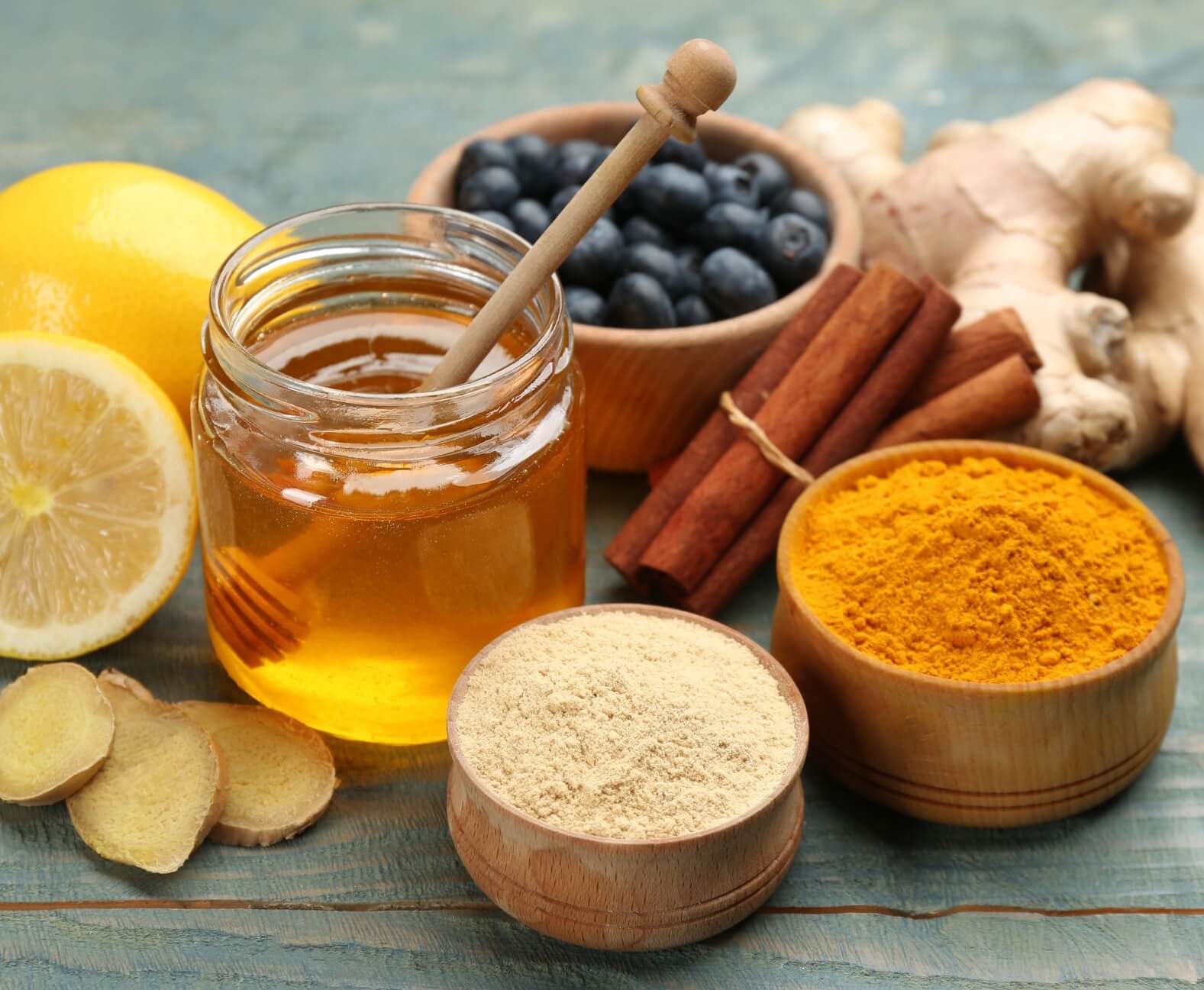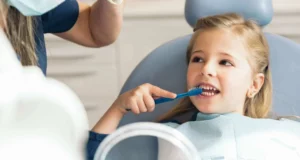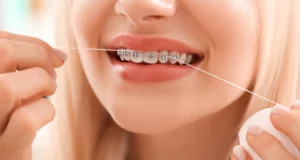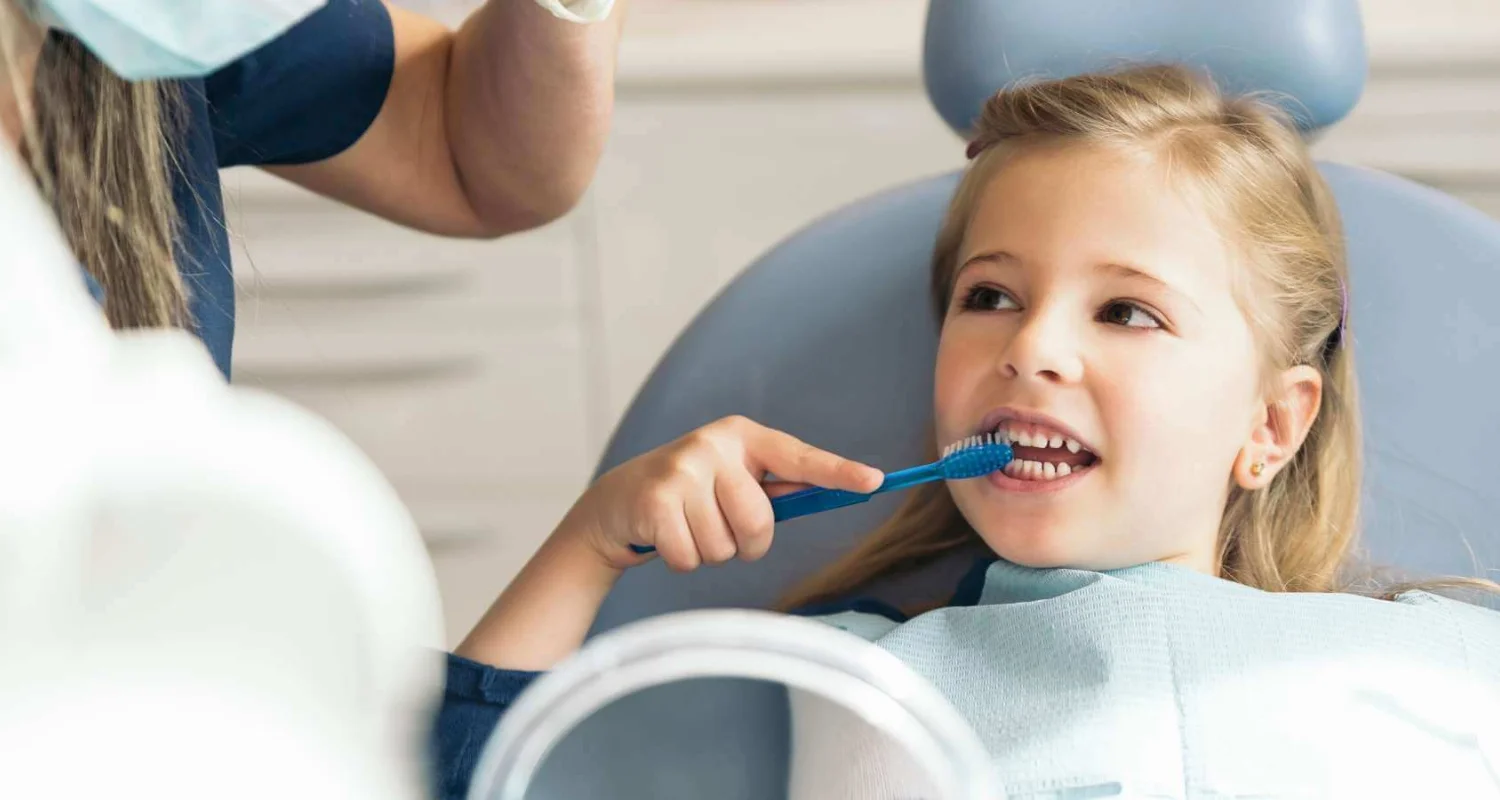Last Updated on: 27th June 2024, 07:53 am
✓ Fact Checked 🕓
❙ Our team of writers, editors, and medical experts rigorously evaluates each article to ensure the information is accurate and exclusively cites reputable sources.
❙ We regularly assess how the content in this article aligns with current scientific literature and expert recommendations in order to provide the most up-to-date research.
Natural Antibiotics to Prevent Dental Infections
Having a dental infection can affect a person’s lifestyle, it is usually quite uncomfortable and incredibly painful. In most cases, dental infections are accompanied by an abscess, an inflammation at the gum level, near the affected tooth, which accumulates pus; sometimes the abscess bursts and the pain is relieved momentarily, but it reappears if the infection is not treated.
Generally, dental infections occur when there is an accumulation of bacteria that can affect the nerve of the tooth or the tissues around it.
Among the usual symptoms are:
• Pain when biting or chewing
• Hypersensitivity to cold, heat, acid, and sweet
• Redness and bleeding of the gums
• Ear and head pain
• Bad breath and bad taste in the mouth
• Fever
• Sore throat
• Inflammation of the face, on the same side as the affected tooth
• Abscesses that drain pus
Untreated dental infections can become complicated and cause even more serious problems that can compromise the patient’s life. That is why it is recommended to go to the dentist at the first sign of an infection.
The most common reasons why a dental infection develops are:
• Advanced dental decay: When a cavity is not treated in time, the bacteria that are on the surface of the tooth begin to penetrate it, destroying it and causing damage to the dental nerve.
• Gum disease: In its initial state, it is called gingivitis. If not treated, it becomes Periodontitis, and if it is allowed to progress, it can affect the bone that holds the teeth.
• Dental trauma: When a tooth is broken due to a fall or blow, it becomes vulnerable to housing bacteria, which later become cavities and can affect the dental nerve.
• Injury from a sharp object: When foreign objects are introduced into the mouth (toothpicks, pens, among others), the gums can be hit and injured, and that open wound is exposed to bacteria inside the mouth and can generate an infection.
• Poor oral hygiene habits: Poor hygiene is the origin of most tooth and gum diseases.
To treat the symptoms of a dental infection, the dentist must eliminate the cause of the infection and prescribe antibiotics. In this article, a series of recommendations will be presented on natural antibiotics that can be used at home to alleviate the pain and discomfort caused by an infection.
Remember that it is important to always be guided by a dentist as he is responsible for defining the ideal treatment in each case, preventing the infection from worsening, and teaching the best way to use remedies and/or medications (frequency and time of use) to make them truly effective.

1. Extra virgin coconut oil

Extra virgin coconut oil is obtained from coconut seeds. It has antimicrobial properties thanks to its content of lauric acid; additionally, it whitens enamel without damaging it and prevents tartar. On the other hand, it reduces inflammation in the gums and prevents inflammation and bleeding.
Instructions for use: It can be used several times a day, as a mouthwash by holding it for around 20 minutes; or the oil can be placed on the toothbrush, teeth can be brushed for 10 minutes, the mouth can be rinsed with warm water and then continue with the usual cleaning routine, using toothpaste and dental floss.
2. Essential oils

These oils are extracted from plants through a distillation process with water or steam. They are widely used therapeutically for their healing, relaxing, and analgesic properties. Avoid the use of aromatic oils, as they can be toxic.
Instructions for use: They can be used as mouthwashes or applied directly to the affected area.
Some of the most common essential oils for treating symptoms caused by dental infections are:
• Tea tree oil: Antiseptic, antifungal, antibacterial, and healing properties.
• Clove oil: Anti-inflammatory and antibacterial properties.
• Lavender oil: Healing, analgesic, and anti-inflammatory properties.
• Oregano oil: Antimicrobial and antioxidant properties.
• Thyme oil: Antiparasitic, antibacterial, and anti-inflammatory properties.
• Eucalyptus oil: due to its high levels of cineole, it becomes a broad-spectrum antibiotic, as well as having antimicrobial and anti-inflammatory properties.
• Vanilla oil: has an anesthetic capacity, which is not very high, but helps to numb tooth pain and relax inflamed gums.
3. Pure cannabidiol oil

This oil is extracted from the flowers of the cannabis plant, along with other cannabinoids. These products are not psychotropic or psychoactive, meaning they do not create any type of addiction. TDifferent studies givecannabinoids therapeutic properties, for example, they are:
• Antimicrobial: Help to decrease bacterial colonies and prevent the formation of biofilm, which is the cause of bacterial plaque and subsequent gum disease.
• Analgesic: Helps with the management of pain caused by a dental infection, as well as chronic pain of systemic origin.
• Anxiolytic: Improves symptoms of anxiety that a patient may present before surgery or a visit to the dentist.
4. Saltwater

Warm saltwater mouthwashes can help control the accumulation of plaque on teeth, heal wounds, relieve pain, kill some bacteria, and even help periodontal abscesses drain, which helps improve symptoms such as pain, and inflammation, and slows down the spread of bacteria.
Instructions for use: Add half a teaspoon of salt to a glass of warm water, swish it around in the mouth, hold it, and then spit it out.
5. Garlic

Garlic is one of the best home remedies used to combat many infections and diseases. It has antibacterial and anti-inflammatory properties that act as natural antibiotics to prevent dental infections. It is one of the best remedies for treating a dental infection, and its analgesic effect is immediate.
If you’d like to learn more about garlic as an alternative remedy for toothaches, you can visit the article here
How to use: It can be used 3 or 4 times a day. Garlic can be used in different ways:
• Crush garlic, extract its juice, and place it on the affected tooth
• Crush garlic, mix it with salt, and apply the paste to the gum
• Chew a clove of garlic
6. Aloe vera

Aloe vera has healing, soothing, disinfectant, antimicrobial, and anti-inflammatory properties. It is generally used to treat burns and wounds on the skin, but due to its properties, it can also be used to improve symptoms caused by a dental infection. It reduces pain, inflammation, and pus production, and helps break down necrotic tissue.
How to use: It can be used directly from the plant, applying a small amount of aloe vera pulp to the affected area, or preparing a juice and rinsing the mouth, several times a day, especially at night before going to bed. Additionally, the gel or juice can be kept in the refrigerator to provide instant relief from pain.
7. Andrographis paniculata

It is a medicinal plant native to southern Asian countries, such as India and Sri Lanka. The extract of the leaves and roots of this plant is used for the treatment of some infectious diseases since it has antimicrobial and anti-inflammatory properties. Its main effect is to stimulate the immune system by improving the response.
How to use: It is used in adults in doses of 90-600 mg per day for a maximum of 12 weeks. It cannot be used in children for a prolonged period. This product also has an oral gel presentation. It is recommended to consult a specialist before using it since its use may affect the outcome of other drug therapies, increasing their side effects or making them less effective.
Andrographis is not indicated in the following cases:
• Small children, pregnant and lactating women: its safety is not clear in these cases, and it may also affect fertility.
• People with severe kidney or liver disease
• People with gallbladder disease: it may stimulate the contraction of the gallbladder
• Patients with autoimmune diseases: Since angiographies increase the immune system response, the underlying autoimmune diseases that the patient has may worsen, such as lupus, and arthritis, among others.
• Anticoagulated patients: it may interfere with blood clotting
• Patients with hypertension: it may further decrease blood pressure
8. Baking soda

The use of baking soda has multiple benefits for oral health. In addition to its antibacterial properties, it is also healing, gentle, and safe for daily use. It reduces odor caused by bacteria, effectively fights bacteria, minimizes plaque acidity, helps prevent gingivitis, whitens teeth effectively reduces stains, and helps prevent cavities.
How to use: It is recommended to dissolve the product in water and rinse the mouth. A paste can also be made with water and placed on the affected area.
9. Onion

This vegetable has a large number of therapeutic components. Its bactericidal, antibiotic, and anti-inflammatory properties prevent various dental and gum diseases such as gingivitis or tartar. It eliminates bacteria and food debris that accumulate between the teeth and also strengthens the gums.
How to use: It can be used as oil or extract, applied to the affected area, or chewed several times a day.
10. Turmeric

It has anti-inflammatory, analgesic, and antibiotic properties. These properties promote the elimination of dental plaque, facilitating the relief of gum diseases such as gingivitis.
How to use: turmeric powder can be used twice a day. Mix a tablespoon of the powder with two tablespoons of water to create a paste. Apply the paste to the affected area and let it sit for five minutes, then rinse it off.
11. Echinacea

Echinacea is a medicinal plant native to North America. It has antiviral, antimicrobial, and antibiotic properties, and is a powerful healer and immune system booster.
How to use: It is recommended to use drops or infusions with fresh leaves to make mouthwash and hold it for a few minutes. This treatment should not be longer than 6 weeks. Echinacea also comes in toothpaste and mouthwash forms for daily use.
Not recommended for children under 12 years old.
12. Ginger

Ginger is a plant originating from India with anti-inflammatory, antibacterial, and analgesic properties. It can inhibit the growth of various types of bacteria and has proven to be very effective against bacteria that cause infectious oral diseases such as gingivitis or periodontitis.
How to use: Ginger can be used four or more times a day and can be crushed, used as a poultice, chewed, or taken as an infusion.
13. Chamomile

Chamomile has anti-inflammatory, analgesic, antibacterial, and antifungal properties. Make chamomile infusions and apply them to the affected area.
How to use: It can also be used in drops, as a mouthwash, or as an essential oil. The ideal concentration of the preparation should be sufficient to obtain better results.
14. Honey

Honey has anti-inflammatory properties and quickly eliminates inflammation and pain. It is also an excellent healer, with a stimulating effect on the growth of cells that repair tissues damaged by infection.
How to use: Place natural honey directly on the site of the infection.
15. Hydrogen Peroxide

Hydrogen peroxide, also known as oxygenated water, can relieve pain and inflammation in the mouth. It can also help eliminate bacteria, reduce plaque, and heal bleeding gums (Gingivitis).
How to use: Prepare the solution correctly by mixing one part of 3% hydrogen peroxide with an equal part of water. Use it as a mouthwash and spit it out. Do not swallow.
16. Grapefruit

Grapefruit seed extract is made from the seeds only, without pulp or juice from the fruit. It is rich in vitamin C and flavonoids, including naringin, which gives grapefruit its bitter taste. It has anti-inflammatory, antioxidant, and antibiotic properties, and can inhibit the growth of bacteria or promote its death.
How to use: Use 20 drops of the extract in half a glass of water, or empty the contents of 2 capsules into the same amount of water. Gargle or use it as a mouthwash, keeping it in your mouth for a few seconds before swallowing or spitting it out.
17. Licorice

Licorice is a natural antibiotic to prevent dental infections with a great anti-inflammatory capacity. It eliminates the bacteria that cause dental and gum diseases.
How to use: It can be used as a mouthwash, or you can suck on the root or a sugar-free candy containing licorice.
18. Fenugreek Tea

Fenugreek is a plant native to the Mediterranean. It has antibiotic properties and is commonly used to treat abscesses, swelling of all kinds, and wash sores.
How to use: It is applied topically to the affected area.
19. Apple cider vinegar (unprocessed)

During its fermentation process, apple cider vinegar forms acetic acid, which helps prevent infections by inhibiting the growth of harmful bacterial species and promoting the elimination of others; it has bactericidal and bacteriostatic properties. It is commonly used for the treatment of wounds and the management of some infections.
How to use: Although some people consume it daily, for oral health use, it is suggested to rinse and spit, and not use it for too long as it can stain teeth.
Conclusion
It should be noted that most natural products described will only provide temporary relief for a dental infection. An untreated infection can become more complicated, and symptoms can become stronger and more difficult to treat.
It is recommended to consult a dentist at the first suspicion of a dental infection and use these products in conjunction with the treatment proposed by the professional. The dentist can indicate the time, mode, and frequency of use.
All patients need to consult a professional before undergoing any home treatment, especially for pregnant or breastfeeding women, as most herbal products are contraindicated in their case.
Frequently Asked Questions
What is the Best Natural Antibiotic for a Tooth Infection?
Most Effective Natural Antibiotics for Tooth Infections
a. Clove: Clove is well-known for its powerful anti-inflammatory and antibacterial properties, which have been extensively studied and validated.
b. Garlic: Garlic is another effective natural antibiotic due to its potent antibacterial effects.
c. Turmeric: Turmeric possesses strong anti-inflammatory and antimicrobial benefits, making it a great option for tooth infections.
d. Warm Saltwater Rinses: Regular rinsing with warm salt water helps to disinfect the mouth and reduce inflammation.
e. Ginger: Ginger offers both antibacterial and anti-inflammatory properties, contributing to its effectiveness in treating tooth infections.
How Do You Get Rid of a Tooth Infection with Antibiotics?
Antibiotics can help stop severe bacterial tooth infections from spreading. Depending on the severity of the infection and your overall health, your dentist may prescribe antibiotics such as amoxicillin, metronidazole, or azithromycin to treat a tooth abscess.
How to Manage a Tooth Infection Without Going to the Dentist?
A tooth abscess requires dental treatment to completely heal, but you can try to relieve symptoms with natural remedies. These include saltwater rinses, baking soda, fenugreek tea, cold compresses, garlic, oil pulling, essential oils, and hydrogen peroxide rinses. However, these methods are not a substitute for professional dental care.
How to Manage a Tooth Infection Without Going to the Dentist?
While a tooth abscess needs dental treatment for complete healing, you can alleviate symptoms with natural remedies. Options include saltwater rinses, baking soda, fenugreek tea, cold compresses, garlic, oil pulling, essential oils, and hydrogen peroxide rinses. However, these methods should not replace professional dental care.
Share:
References
1. Jay, K. (August 12, 2022). 10 Home Remedies for a Tooth Abscess. Healthline. https://www.healthline.com/health/home-remedies-for-abscess-tooth
2. Johnson, J. (January 27, 2020). Gum abscess: Everything you need to know. https://www.medicalnewstoday.com/articles/gum-abscess
3. Shanbhag, V. (2017). Oil pulling for maintaining oral hygiene – A review. Journal of Traditional and Complementary Medicine, 7(1), 106-109. https://doi.org/10.1016/j.jtcme.2016.05.004
4. Sorkin, C. (January 11, 2023). Home Remedies for a Tooth Infection. K Health. https://khealth.com/learn/dental-infection/home-remedies/
5. Stahl, V., & Vasudevan, K. (2020). Comparison of Efficacy of Cannabinoids versus Commercial Oral Care Products in Reducing Bacterial Content from Dental Plaque: A Preliminary Observation. Cureus. https://doi.org/10.7759/cureus.6809
6. Toothache Home Remedies. (Reviewed July 30, 2020). WebMD. https://www.webmd.com/oral-health/home-remedies-toothache
7. 10 natural remedies for a tooth infection. (s. f.). Guardian Direct. https://www.guardiandirect.com/dental-care/10-natural-remedies-tooth-infection
8. Andrographis. (Reviewed Nov 06, 2021). RxList. https://www.rxlist.com/andrographis/supplements.htm
9. Andrographis. (s. f.). Memorial Sloan Kettering Cancer Center. https://www.mskcc.org/cancer-care/integrative-medicine/herbs/andrographis














